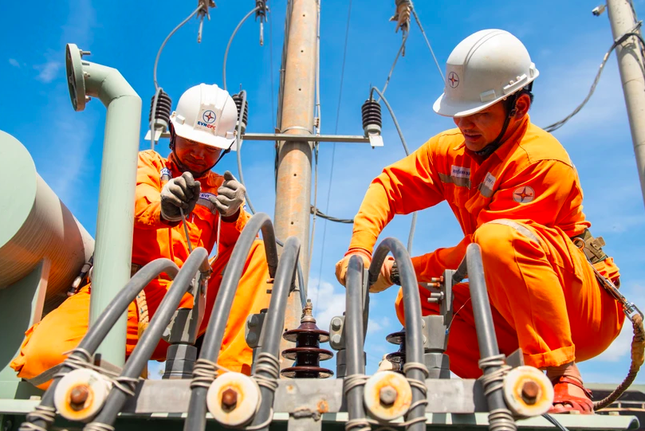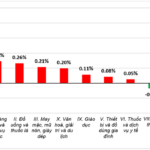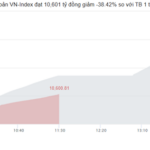Housing and construction materials was the group with the highest increase, rising by 0.36%, which pushed up the overall CPI by 0.07 percentage points. This was largely due to a 1.82% increase in electricity prices for household use, as demand surged during the hot summer months. From May 10th, the Vietnam Electricity Group (EVN) implemented an increase in electricity tariffs.

Household electricity prices rose by 1.82% due to increased demand during the hot season.
Additionally, the cost of home maintenance materials rose by 1.96% as a result of increased prices for bricks, sand, and stones due to limited supply, as well as higher production and transportation costs. Kerosene prices also witnessed a 2.64% increase due to adjustments in retail prices during the month.
The beverages and tobacco group saw a 0.25% increase due to higher consumer demand during the summer and rising production costs.
The culture, entertainment, and tourism group witnessed a 0.2% increase, while the food and dining services group rose by 0.18%. The household equipment and appliances group increased by 0.1%. There were also slight increases in the clothing, headwear, and footwear group, as well as the medicine and healthcare services group, and the education group.
On the other hand, two groups of goods and services saw a decrease in their price indices: postal, telecommunications, and transportation.
The transportation group decreased by 0.48%, causing a 0.05 percentage point drop in the overall CPI. This was mainly due to a slight decline in fuel prices during the month. However, passenger transport services, such as train and air fares, saw price increases. Some items in the vehicle parts subgroup also experienced rising prices.
The postal and telecommunications group witnessed a slight decrease due to lower prices for both services and equipment.
Compared to December 2024, July’s CPI rose by 2.13%. Year-on-year, CPI increased by 3.19%. For the first seven months of 2025, the average CPI rose by 3.26% compared to the same period last year, while core inflation rose by 3.18%.
As of July 31st, the average global gold price stood at 3,369 USD/ounce, a slight decrease of 0.02% from the previous month. In July, inflation expectations in the US and Europe remained relatively stable, with the US Federal Reserve (FED) keeping interest rates unchanged. Additionally, the demand for physical gold investment in major markets like China and India did not see any significant spikes, contributing to stable price levels.
Domestically, the gold price index rose by 1.02% compared to June, due to a low circulation of gold bars in the market. It increased by 49.7% year-on-year and by 34.9% compared to December 2024. On average, gold prices rose by 39.09% in the first seven months.
The value of the US dollar fluctuated in opposite directions in the domestic and global markets. As of July 31st, 2025, the global USD index reached 97.61 points, a 1.0% decrease from the previous month, as the market anticipated that the FED would soon loosen monetary policies to support economic growth, reducing the appeal of the US dollar.
In the domestic market, the USD price index rose by 0.37% compared to the previous month, 3.39% year-on-year, and 3.3% compared to December 2024. On average, the USD price index increased by 3.32% in the first seven months.
The Vice Premier’s Directive on Electricity and Fuel Price Regulation
“The esteemed Vice Prime Minister, Ho Duc Phoc, emphasizes the critical importance of effective price management and governance as a pivotal strategy to propel economic growth. Among the key areas of focus, he highlights the management of electricity and fuel prices, underscoring their impact on the broader economy. This directive serves as a timely reminder of the government’s commitment to fostering a stable and prosperous Vietnam.”
The Power Sector’s Prominent Policies in 2024
In 2024, the power industry witnessed a series of events and policy changes. Notably, EVN was authorized to increase electricity prices on a quarterly basis, the amended Electricity Law was passed, and regulations on renewable energy were introduced. These developments marked significant shifts in the industry’s landscape over the past year.
Unlocking New Frontiers in Energy: The Amended Power Law Lights the Way for Innovative Electricity Ventures
On November 30, the National Assembly passed the amended Power Law with an overwhelming majority of 439 out of 463 delegates voting in favor, accounting for 91.65%. This pivotal piece of legislation carries significant weight, impacting the economy and ensuring the nation’s growth, development, and energy security.












































